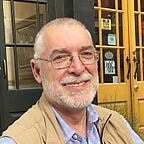Breaking and Mending
This morning I was reading The Best Jokes of 2021 in the New Yorker, and at the end I came across a jarringly unrelated article, The Case for Not Being Born by anti–natalist David Benatar, who argues with weird compassion that the pains of life so overwhelmingly dominate its pleasures that no one should have children, ever again. And at the end of that article I came across A Choir at the Crossroads of Boyhood and Manhood, a moving documentary about the painful transition from boy to man that takes place in the members of a Swedish boys choir.
I have sung in choruses, choirs, and a cappella ensembles all my life, since I was in the 3rd grade. When puberty strikes, a chorister’s high, sweet soprano voice “breaks” and he is enveloped in a quagmire from which he fears he might never escape. The transition can take weeks or months, and during it he no longer can intone the high pitches he used to hit with ease, nor can he reach the lowest pitches of his register he will eventually enjoy. Worse, the notes he still can voice occasionally “break” — a high pitch will discontinuously drop to one an octave lower. Many boys stop singing during the passage, some never to sing again.
The choir director Karin Skogberg Ankarmo gently guides her young charges through their painful transformations by including all of them, “broken” or not, in The Voice Break Choir, allowing them to keep singing until their voices stabilize and they can join the Men’s Choir. Most adolescent boys, of course, are not choristers, and the breaking of their voices is not very traumatic, if at all. But for these boys, it makes the journey through puberty even more difficult.
The core of the article is a 28–1/2 minute video consisting largely of interviews with the boys and original performances with lyrics taken from those interviews. I was struck by the depth of their emotional mindfulness, and the maturity and eloquence with which they examine and articulate their experiences, wonderful to see in those so young. The feeling of not belonging is familiar to me. It is a toxic and corrosive element of self–doubt and a primary contributor to feelings of worthlessness.
One of the boys relates, “I had my heart broken. A long time ago. I liked a girl very much. But she started dating another guy.” Later this boy continues, “Right now, I just want to graduate. The prom is coming up. I have no date for the prom, so I don’t know what to do. There’s one girl that I’d like to go with and she has no prom date, but I’m too scared to ask her. If she turns me down, everyone will laugh at me. … I don’t want that experience.”
Long ago, I had my heart broken for the first time. It was in 4th grade. My family moved around a lot, and it was only the second year I had been at that school. I was not friendly with any of the other students. In art class, we were supposed to draw a still life, with some fruit on a platter. My mom had always served us green grapes. I had never seen a purple grape in my life. I am not entirely unskilled at drawing, and I produced a passably good sketch. The color of the grapes was just right, exceptionally so. I showed it to this girl I had a secret crush on. She replied, “That’s so tacky, everyone knows grapes are purple.” That was the last time I shared my innermost feelings with anyone for the next 40 years.
At any rate, if your attention span and interest are sufficient, give the article and especially the embedded video a try. It is heartbreaking and heartwarming by turns, at least to me. By the way, I strongly reject David Benatar’s premise. The moments of joy we experience, fleeting as they might be, should define the meanings of our lives. Especially when we share them with those we love and who include us, accept us just as we are, warts and all. These communal encounters vastly exceed in magnitude and excellence all the inescapable suffering attendant upon living. The world is broken, a shredded tapestry fallen from an earlier innocence prior to our arrival and that of our self–percipience. But by entrusting our vulnerabilities to others we mend it, one stitch at a time.
All the best,
On Saturday, 12/04 from Broomall, PA
Rex
